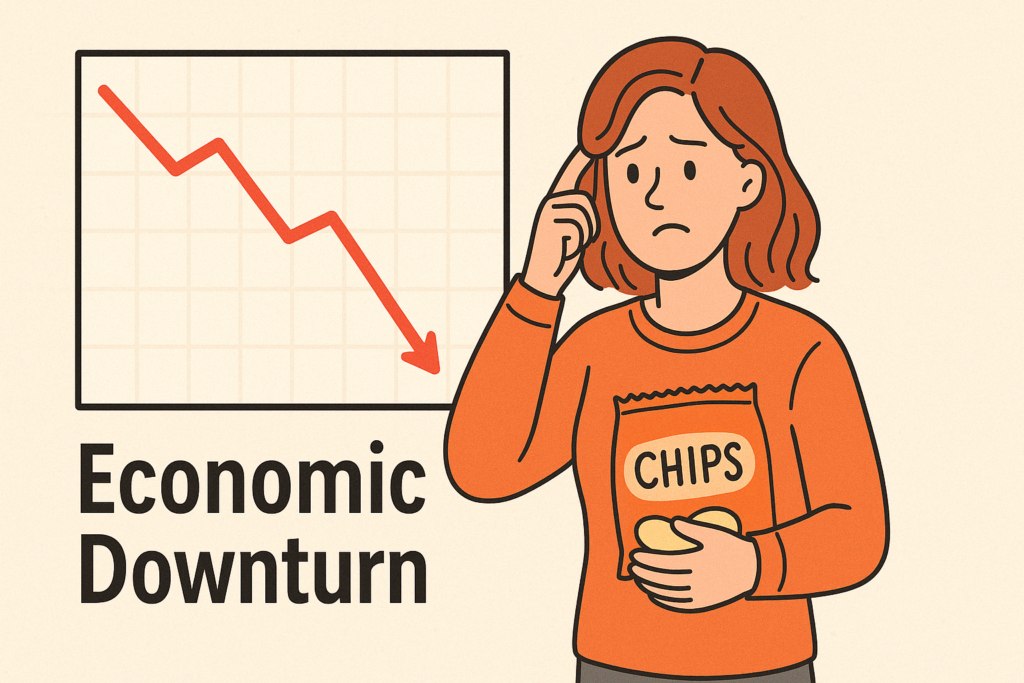So here we are again—whispers—the economy is acting sketchy. Banks are nervous. Stocks are sulking. And everyone’s Googling “how to prepare for an economic downturn” like it’s the new zodiac sign.
But don’t panic-buy canned beans just yet.
Economic downturns aren’t the end of the world. They’re more like that messy friend who shows up uninvited, crashes on your couch, and eats your last avocado. Annoying? Yes. Manageable? Absolutely—if you’ve done some recession planning.
Let’s talk about how to stay financially sane when the economy’s throwing a tantrum.
Step One: Check Your Financial Pantry Before Freaking Out
Before you go full doomsday mode, take stock. Literally. What’s in your savings? Do you have an emergency fund, or is your “rainy day account” just five bucks and a Blockbuster gift card?
Financial safety starts with knowing your numbers. And no, that doesn’t mean obsessively watching CNBC until you forget how to blink. It means pulling up your bank app and asking:
- How many months of expenses can I cover if work slows down?
- Are there subscriptions I forgot I was even paying for? (Looking at you, “free trial” from 2022.)
- Can I dial back on the extras without becoming a hermit?
This isn’t about living like a monk. It’s about knowing your baseline so you can chill, even if the stock market is having a midlife crisis.
Cut the Fat, Not the Fun
Here’s the thing: budgeting during a downturn doesn’t have to be boring. You don’t need to cancel all joy and live off instant noodles (unless you want to, no judgment).
Just… be smarter with your cash. That $6 oat milk latte? Fine. But maybe not seven of them a week. Little tweaks = big impact.
Think of it like decluttering your finances. You’re Marie Kondo-ing your spending. If it doesn’t spark financial safety, it’s gotta go.
And if anyone tries to guilt you for still getting the occasional brunch? Remind them that economic health includes mental health. (Also, brunch is basically therapy with toast.)
Recession Planning: Adulting, but Make It Strategic
Okay, let’s say things get dicey. Recession officially hits. Now what?
This is where recession planning comes in. Think of it like your personal economic emergency kit. You want to have:
- A backup income idea (side hustle, freelance gig, rental space—whatever doesn’t drain your soul)
- A lean monthly budget that still lets you live, not just survive
- A plan for paying off high-interest debt (because that stuff snowballs like gossip in a group chat)
And don’t forget to stash away what you can. Even small savings now can be your buffer later. It’s less about hoarding cash and more about building cushion. Comfort, but make it liquid.
When the Market’s a Rollercoaster, Don’t Jump Off
Let’s talk market strategies, because panic-selling is not a personality trait. If you’ve got investments—stocks, retirement funds, crypto (you rebel)—resist the urge to treat them like a hot potato the second things get wobbly.
Historically, markets recover. Yes, even after dramatic dips. So unless your goal is to buy high and sell low (a terrible strategy, by the way), chill. Or better yet, talk to someone with a license and a spreadsheet—aka, a financial advisor.
This isn’t financial advice, it’s common sense wrapped in a friendly nudge: Don’t let headlines bully your bank account.
Don’t Let Fear Drive the Bus (It’s a Terrible Driver)
Here’s the weird part about downturns: they expose how emotional money really is. We think we’re rational, but one news alert and we’re bulk-buying rice like it’s 2020 all over again.
That’s why preparation > panic. When you’ve got a plan—loose, flexible, human—you don’t have to spiral. You can keep living. Keep laughing. Even keep traveling (just maybe less Bali, more backyard barbecue).
Because economic downturns aren’t just about numbers. They’re about mindset. And if you’re prepared, you don’t have to flinch every time someone says “recession” like it’s Beetlejuice.
Final Thought:
The economy will wobble. It’s what it does. But your whole life doesn’t have to shake every time it does. Prep a little, spend smart, laugh often, and keep your weird snack fund intact.
Because no matter what the markets say, emotional stability is priceless—and so is that emergency bag of Flamin’ Hot Cheetos.


